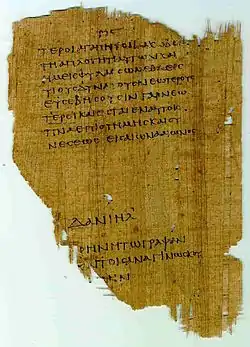Papyrus 967
Papyrus 967 is a 3rd-century biblical manuscript, discovered in 1931. It is notable for containing fragments of the original Septuagint text of the Book of Daniel, which was completely superseded by a revised text by the end of the 4th century and elsewhere survives only in Syriac translation and in Codex Chisianus 88. The manuscript is also important for early variants, both in the text of the Book of Ezekiel and of the Book of Daniel.

P. Köln Theol. 37v (Susanna 62a-62b)
The surviving 59 manuscript pages of P 967 are at present kept in five different places.
- 29 foll. Chester Beatty Library (Dublin) as Chester Beatty IX-X; at the first review of the papyrus in 1933, the fragments of Ezekiel and Esther were interpreted as belonging to an independent papyrus as those of Daniel and were given the number IX and the obsolete Rahlfs number "P 968".
- 21 foll as John H. Scheide Papyrus 3 in Princeton University Library
- substantial portions are kept by Cologne University Library
- 2 foll. in Santa Maria de Montserrat Abbey, Barcelona as Scriptorium Biblicum et Orientale P Barc. Inv. 42 + 43
- several foll. in Madrid, as Fundación Pastor de Estudios Clásicos, P Matr. 1
Editions
- Angelo Geißen: Der Septuagintatext des Buches Daniel, Kap 5–12, zusammen mit Susanna, Bel et Draco, sowie Esther 1,1a–2,15 nach dem Kölner Teil des Papyrus 967. Papyrologische Texte und Abhandlungen 5. Bonn 1968.
- Winfried Hamm, Papyrologische Texte und Abhandlungen 10/21 (1969, 1977)
- Leopold Günther Jahn: Der griechische Text des Buches Ezechiel nach dem Kölner Teil des Papyrus 967. Papyrologische Texte und Abhandlungen 15. Bonn 1972.
- Allan Ch. Johnson; Henry S. Gehman; Edmund H. Kase: The John H. Scheide Biblical Papyri: Ezekiel (Princeton Studies in Papyrology 3). Princeton 1938.
- Frederic G. Kenyon: The Chester Beatty Biblical Papyri VII: Ezekiel, Daniel, Esther. Text. London 1937. Plates. London 1938.
- Information and Fotos of the Cologn part: http://www.uni-koeln.de/phil-fak/ifa/NRWakademie/papyrologie/PTheol1.html
References
- M. Fernandez Galliano: "Notes on the Madrid Ezekiel Papyrus", In: Bulletin of the American Schools of Oriental Research (BASOR), 5 (1968), 349-356.
- Siegfried Kreuzer: Papyrus 967. Bemerkungen zu seiner buchtechnischen, textgeschichtlichen und kanongeschichtlichen Bedeutung, in: Martin Karrer; Wolfgang Kraus (Hg.): Die Septuaginta. Texte, Kontexte, Lebenswelten, WUNT 219, Tübingen 2008, 64-82; English version: Siegfried Kreuzer, Papyrus 967. Its Significance for Codex Formation, Textual History, and Canon History. In: Siegfried Kreuzer, The Bible in Greek. Translation, Transmission, and Theology of the Septuagint, SBL.SCS 63, Atlanta GA 2015, 255-271.
- Silvio S. Scatolini Apóstolo: Ezek 36, 37, 38 and 39 in Papyrus 967 as Pre-Text for Re-Reading Ezekiel. In: Florentino García Martínez; Marc Vervenne (ed.): Interpreting Translation: Studies on the LXX and Ezekiel in Honour of Johan Lust (BEThL 192). Leuven 2005, 331-357.
- Peter Schwagmeier: Untersuchungen zu Textgeschichte und Entstehung des Ezechielbuchs in masoretischer und griechischer Überlieferung. Diss. theol. Zürich 2004.
- Joseph Ziegler: Die Bedeutung des Chester Beatty-Scheide Papyrus 967 für die Textüberlieferung der Ezechiel-Septuaginta. In: ZAW 61 (1945/48), S. 76-94.
- Alfred Rahlfs and Detlef Fraenkel, Verzeichnis der griechischen Handschriften des Alten Testaments Bd. 1: Die Überlieferung bis zum VIII. Jahrhundert, Göttingen: Vandenhoeck & Ruprecht, 2004 p. 99-103.
External links
- P 967 Rahlfs (uni-koeln.de)
- Ernst Würthwein, The Text of the Old Testament: An Introduction to the Biblia Hebraica (Eerdmans 1995), p. 194
- Mª Vª Spottorno y Díaz Caro, "The Divine Name in Ezekiel Papyrus 967" in Natalio Fernández Marcos (editor), La Septuaginta en la Investigación Contemporánea (V Congreso de la IOSCS) (Editorial Consejo Superior de Investigaciones Scientíficas, 1985), pp. 216–217
- P 967 images at the National Library of Spain
- Chester Beatty portion images at CSNTM
- Montserrat images
This article is issued from Wikipedia. The text is licensed under Creative Commons - Attribution - Sharealike. Additional terms may apply for the media files.